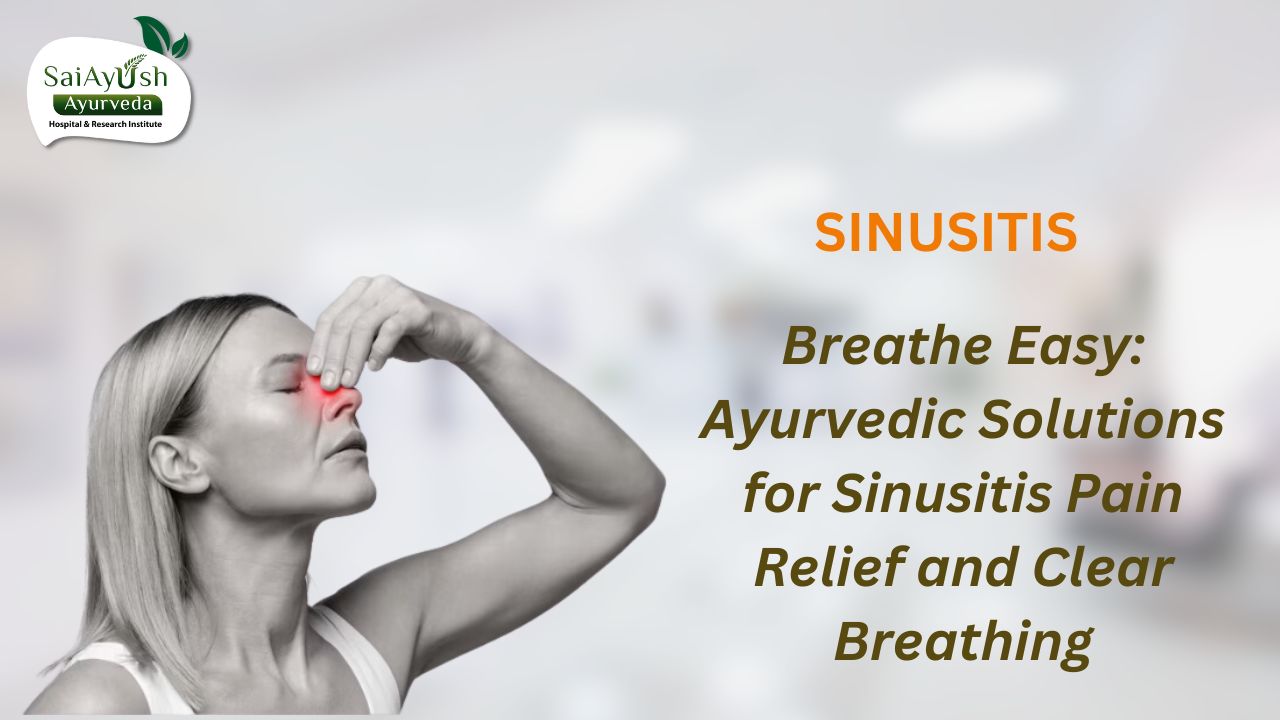Sinusitis Introduction:
Sinusitis is a disorder characterized by inflammation of the tissues lining your sinuses, which are cavities normally filled with air. It occurs as a result of an inflammatory reaction or infection from a virus, bacteria, or fungus. While modern medicine has a number of sinusitis treatments available, Ayurveda, an ancient holistic healing system, offers natural medicines that target the condition’s underlying causes.
What is sinus?
The sinuses are air filled cavities in the skull. 4 paired sinuses are maxillary sinus, ethmoid sinus, frontal sinus, sphenoid sinus.
What causes sinusitis?
- Viral infections, such as the common cold or flu, can lead to sinusitis when the sinuses become inflamed and mucus flow is obstructed.
- Bacterial Infections: Sinusitis can also occur as a result of bacterial infections. When the sinuses are blocked, bacteria can grow and cause an infection.
- Allergies to substances like pollen, dust mites, or pet dander can trigger sinusitis by causing inflammation and blocking mucus drainage.
- Structural abnormalities in the nasal passages, like a deviated septum, nasal polyps, or tumors, can obstruct the sinuses and promote bacterial or fungal infections.
- Lifestyle factors, including smoking and exposure to pollutants, can irritate the sinus lining and increase the risk of sinusitis.
- Individuals with weakened immune systems, such as those with HIV/AIDS or undergoing chemotherapy, are more susceptible to sinus infections.
Types of sinusitis
- Acute Sinusitis: This type of sinusitis is usually caused by a viral infection and lasts for a short period of time, typically less than four weeks. It is characterized by symptoms such as facial pain, nasal congestion, thick nasal discharge, and a reduced sense of smell.
- Chronic Sinusitis: Chronic sinusitis refers to sinus inflammation that lasts for 12 weeks or longer. It may be caused by persistent infection, nasal polyps, a deviated nasal septum, or underlying medical conditions. Symptoms include nasal congestion, postnasal drip, facial pressure or pain, and fatigue.
- Subacute sinusitis: in this sinusitis th symptoms and swellings is present from 1-3 months
Ayurvedic Perspective on Sinusitis: Symptoms and Diagnosis
According to Ayurvedic principles, sinusitis is caused by an imbalance in thePitta and Kapha dosha, which leads to the accumulation of mucus , inflammation in the sinuses which then causes intense pain. Symptoms of sinusitis from an Ayurvedic perspective may include:
- Nasal congestion and blockage
- Thick and discolored nasal discharge
- Facial pain and pressure, particularly around the forehead, cheeks, and eyes
- Headache
- Reduced sense of smell and taste
- Fatigue and lethargy
- Coughing, especially with mucus
- Sore throat and postnasal drip
Ayurvedic Diagnosis of Sinusitis:
Ayurvedic diagnosis of sinusitis involves examining the symptoms and evaluating the individual’s overall constitution (prakriti) and the imbalance of doshas (vikriti). The Ayurvedic practitioner will typically assess the pulse, tongue, and general physical examination. They may also inquire about the patient’s medical history, diet, lifestyle, and any specific triggers that exacerbate the symptoms.
Ayurvedic Treatment for Sinusitis: Herbs and Therapies That Work
Nasya: Nasya is a popular Ayurvedic treatment for sinusitis. It involves the administration of medicated oils or herbal preparations through the nasal passages. This helps to relieve congestion, reduce inflammation, and clear the sinus passages.
Steam Inhalation: Inhalation of herbal steam is another effective Ayurvedic remedy for sinusitis. Boiling water infused with beneficial herbs like eucalyptus, mint, or camphor can help alleviate nasal congestion, open up the sinuses, and provide relief.
Herbal Remedies: Ayurveda recommends specific herbal remedies for sinusitis, such as Trikatu (a combination of ginger, black pepper, and long pepper), Sitopaladi Churna (a powdered formulation for respiratory health), and Talisadi Churna (a herbal formulation for cough and cold). These herbs help to reduce inflammation, boost immunity, and provide relief from symptoms.
Panchakarma: In severe or chronic cases of sinusitis, Ayurvedic practitioners may recommend Panchakarma therapies. These include procedures like Vamana (therapeutic vomiting) and Nasya (nasal administration) as part of a detoxification and rejuvenation process. Panchakarma helps to remove toxins, balance doshas, and improve overall respiratory health.
Yoga and Pranayama: Specific yoga asanas (postures) and pranayama (breathing exercises) can help open up the sinuses, improve respiratory function, and reduce congestion. Practices like Kapalabhati (skull-shining breath) and Anulom Vilom (alternate nostril breathing) are beneficial for sinusitis.
It’s important to note that Ayurvedic treatments should be carried out under the guidance of a qualified Ayurvedic practitioner who can provide personalised recommendations based on individual needs and conditions.
Ayurvedic Lifestyle Changes to Manage Sinus Problems Effectively
Ayurveda emphasizes the importance of a healthy lifestyle in managing sinusitis. This includes avoiding cold and damp environments, staying hydrated, maintaining proper hygiene, and following a balanced diet. Consuming warm, easily digestible foods and avoiding cold or greasy foods can help alleviate symptoms.
Conclusion: Ayurveda, an ancient system of medicine originating from India, offers various approaches to managing sinus infections and promoting natural breathing. While Ayurveda can provide some relief, it’s important to note that sinus infections can be serious and potentially require medical attention. It’s always advisable to consult with a healthcare professional for an accurate diagnosis and appropriate treatment options.
Discover the healing power of Ayurveda with our latest article at Sai Ayush Ayurveda Hospitals! Dive into the age-old wisdom that can rejuvenate your body and mind. Click here to read more:




0 Comments